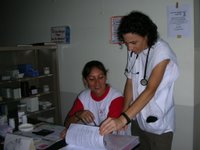 The Project I am working on here in Puerto Barrios is officially titled “Atención Integral A Las Personas Viviendo Con VIH/SIDA En Izabal.” This is translated roughly as “Interdisciplinary Care For People Living with HIV and AIDS in Izabal.” Izabal one of the poorest districts in Guatemala. It is also one of the districts with highest HIV/AIDS prevalence. The few hospitals and clinics equipped to diagnose and treat HIV/AIDS, however, are in the country’s capital. MSF runs the only HIV treatment clinics outside the country’s capital.
The Project I am working on here in Puerto Barrios is officially titled “Atención Integral A Las Personas Viviendo Con VIH/SIDA En Izabal.” This is translated roughly as “Interdisciplinary Care For People Living with HIV and AIDS in Izabal.” Izabal one of the poorest districts in Guatemala. It is also one of the districts with highest HIV/AIDS prevalence. The few hospitals and clinics equipped to diagnose and treat HIV/AIDS, however, are in the country’s capital. MSF runs the only HIV treatment clinics outside the country’s capital.Although there is little reliable epidemiologic data, Guatemala is thought to have an HIV prevalence of approximately 0.9% (UNAIDS Data). For those of you who do not have the stats at your fingertips, 0.9% prevalence is higher than that of the US (about 0.6%), but much lower than the prevalence in Sub-Saharan Africa (south Africa 18%, Lesotho 23%, Uganda 7%).
The Izabal project was started by MSF-Espana in 2003. As I understand it, Guatemala was making little progress with prevention, diagnosis, and treatment of HIV in the early 1990s. The few facilities that were managing HIV patients were all in Guatemala City. MSF Espana started this project in order to decentralize HIV/AIDS care and offer care to poor people who cannot afford to travel to Guatemala City. In addition to managing the field work in Izabal, the MSF Espana capital team works with the Guatemalan Ministry of Health on logistics of ARV purchase, among other things.
I work in the HIV/AIDS clinic in Izabal’s District Hospital (Hospital Nacional). We have about 800 outpatients, who come as far as the Northern border of Guatemala/Mexico. Many patients have to leave the day before their appointment in order to get to the clinic on time. They travel up to 12 hours on dirt roads to get to the Hospital. They sometimes sleep overnight in a room attached to the hospital. We also take care of all the HIV/AIDS inpatients.
Outside the Hospital, our team also organizes the HIV program at the Children’s Hospital and the “Centros de Salud,” trains counselors, supplies HIV tests, buys Anti-retroviral drugs and medicines for opportunistic infections, organizes press campaigns, and supports community groups and education.
After three years, MSF is attempting to” handover” all of the HIV/AIDS education and care to back to the Guatemalan public sector. Supposedly, the government will take full financial and organizational responsibility for the hospital, pharmacy, and clinics by 2008. In 2007, the Global Fund for AIDS, TB, and Malaria will financially support the HIV programs. MSF will watch from afar. We will keep an office in Puerto Barrios and Guatemala City until July 2007. After July 2007, the project is scheduled to officially close, and MSF-Espana will likely leave Guatemala altogether.
I have not been here long (and I do not know much), but I have little hope that the government will be able to actually supply and run a clinic after MSF leaves. Dolors (our Project Coordinator) thinks the Children’s Hospital might manage, but they only have about 25 patients with HIV/AIDS. The HIV clinic at the Hospital Nacional has more than 800 patients, however, and the hospital is a Disaster (more on this later). [Yes, it is even more inefficient than a certain Northern Manhattan Hospital.] . Henry, the Guatemalan doctor who I work with, plans to leave when MSF leaves. He says that the government will not pay him enough to live.
The leadership and organization of Izabal’s Hospital Nacional is only part of the problem. Guatemala’s public hospital system itself is precarious, to say the least. Since July 2006, the doctors in public hospitals nationwide have been intermittently on-strike. They are not asking for salary increases. They want supplies for the hospital and clinics. The doctors say that the Ministry of Health does not buy the medicines and supplies they need to take care of patients.
Even if the Hospital Nacional maintains the HIV clinic organization and Human Resources that MSF set up, at times I have little hope that the government will stay on-top of ordering medicines and supplies. I worry that much MSF’s work will be lost, and our patients will be left without medicines and perhaps without staff to take care of them.
There is much internal debate within MSF about the presence of the organization in non-emergency settings. Should this NGO get involved in chronic care in the first place? Does HIV/AIDS count as chronic care or is it an emergency epidemic? Should MSF stick with emergency care during a war or after a natural disaster? Can we leave Izabal before we are sure that the Government will take care of our patients?
No comments:
Post a Comment